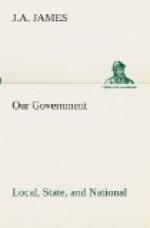President Cleveland vs. The Governor of Illinois.—In addition to destroying property belonging to the railways centering in Chicago, the striking employees prevented the free movement of the trains. Mr. Altgeld, then governor of Illinois, did not provide against these abuses, and President Cleveland ordered the United States troops under General Miles to suppress the rioting. The President, who was severely criticized by Mr. Altgeld, justified his sending the troops on the following grounds: (1) that the processes of the Federal courts could not be executed; (2) that the transportation of the United States mails was obstructed; and (3) that the laws on interstate commerce were not enforced.
The United States Supreme Court took the same position as President Cleveland in a case which grew out of these riots. Mr. Justice Brewer, in delivering the opinion of the court, said: “We hold that the government of the United States is one having jurisdiction over every foot of soil within its territory and acting directly upon each citizen; that, while it is a government of enumerated powers, it has within the limits of those powers all the attributes of sovereignty; that to it is committed power over interstate commerce and the transmission of the mails, and that these powers have been assumed and put into practical exercise by the legislation of Congress.”
SUPPLEMENTARY QUESTIONS AND REFERENCES.
1. What have been some of the most important treaties entered into on the part of the United States?
2. For the treaty made at the close of the Spanish-American War, see Rev. of R’s, 18: 258, 371, 515, 631; 19: 11, 261, 262, 266, 267.
3. In what ways may a treaty be abrogated? Harrison, This Country of Ours, 140, 141.
4. May a President have many of the privileges of private life? Harrison, This Country of Ours, 177-180.
5. What are some of the official cares of the President? Harrison, This Country of Ours, 162-177.
6. The overworked President. McClure’s Mag., 28: 483-492; Rev. of R’s, 25: 464-466.
7. Secure a copy of the last report of the Civil Service Commission, and also Manual of Examinations for the Classified Service of the United States, and look up the following:—
a. How many persons are included in the civil service of the United States?
b. What proportion of them is included in the classified service?
c. Does the law of 1883 seem to have brought about satisfactory results?
d. What offices have been included in the extension of the Civil Service Law?
e. What is the nature of the questions asked in the examinations? i




